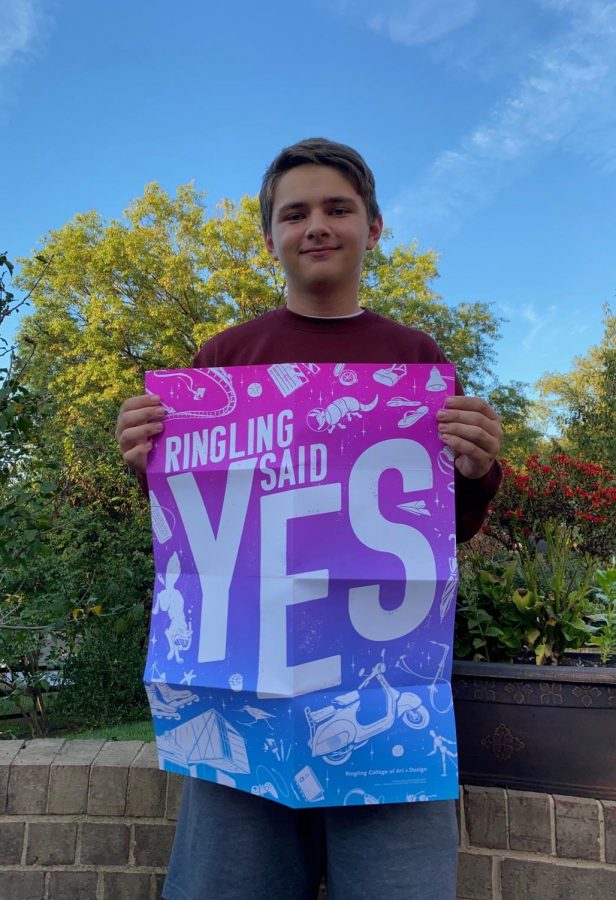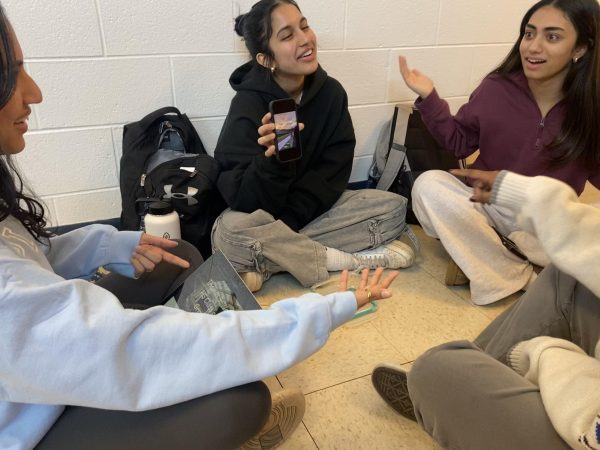A Lukewarm Perspective: College apps
Senior Luke Jordan holds up his acceptance sign from Ringling College of Art and Design. He applied for the school on the Common App.
The college application process is a senior’s worst nightmare. It’s a race against time to complete and adds more work to an already stressful schedule. In a perfect world, every college would use the same system to save seniors time. Unfortunately, we don’t live in such a fantasy land. Fortunately for you, however, I’m here. By the end of this article, you’ll know which schools require which application and whether or not you should bother applying.
Common App
The gold standard of the college application, the Common App is by far the most popular. Over 900 schools across the nation and beyond accept applications this way. With Common App schools, you fill out your application once and from there it’s just a matter of sending it out wherever you please, with some caveats of course. No need to spend days inputting identical information into different outlets. The Common App centralizes the application process in a way no competitor is able to. Not only is it convenient, but it’s well set up too. Its interface is built in a way that isn’t confusing or convoluted, providing a user-friendly experience. If a school provides the option to submit through the Common App, you should do it. It’s easy to use and—chances are—if you have another school in mind, they probably also take the Common App.
A few schools that take the Common App include the universities of: Maryland, Michigan, North Carolina, Penn State, Columbia, Cornell, Harvard and Yale.
Universal College App
A far newer and less popular option, the Universal College App is essentially a knockoff Common App. If the Common App is Coke, the Universal College App is Pepsi. Both offer similar features, but the scope of this method is far more limited. Only nine schools take this application, with the majority taking the Common App as well. At the end of the day, why bother with the Universal College App. Unless it’s the only option a certain school provides, it makes far more sense to opt for the Common App instead.
All schools that take the Universal College App are the universities of: Brandeis, Chicago, Duke, Johns Hopkins, Rice, Vanderbilt, Cornell, Harvard and Princeton.
Coalition
A middle ground in the college application landscape, the “Coalition for Access, Affordability, and Success,” as it’s officially known, takes a different approach from its competition. Students can begin work on their Coalition application as early as their freshman year. With their “locker” feature, underclassmen can lay the foundation for their portfolio far in advance, thus reducing the stress of senior year. Though not as big as the Common App, Coalition still boasts a sizable number of schools at around 150, with that number only expected to increase. Overall, applying through Coalition isn’t a bad idea. Though most Coalition members also accept the Common App, a few major universities throughout states like New Jersey, Texas and Washington don’t.
A few schools that take Coalition include the universities of: all schools mentioned in the Common App section, as well as Coalition-only schools like Rutgers, Texas and Washington.
The decision to apply through any of these methods or even independently really all depends on what schools interest you.
Your donation will support the student journalists of Thomas S. Wootton High School. Your contribution will allow us to purchase equipment and cover our annual website hosting costs.
Luke Jordan is a 2022 graduate.










![Junior Grace Song rewatches the trailer for Anora. Promoted as "A Love Story from Sean Baker," it is the eighth feature film under Baker's belt starring Mikey Madison in the titular role. "[Anora] accurately represents women overseen and easily taken advantage of. It emotionally enticed me. The ending is so good," Song said.](https://woottoncommonsense.com/wp-content/uploads/2024/11/Rc5RQTdjtUFtyT7IyQe1rSxkpOTc6NoksY8jtoop-e1732201365565-600x450.jpg)